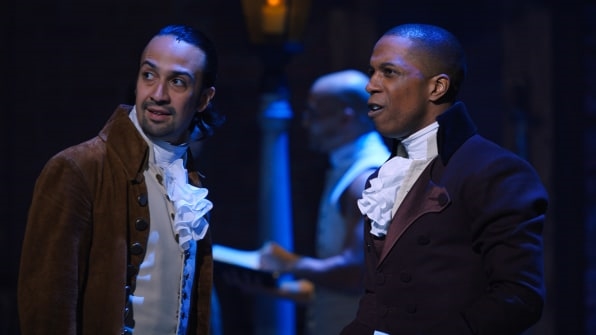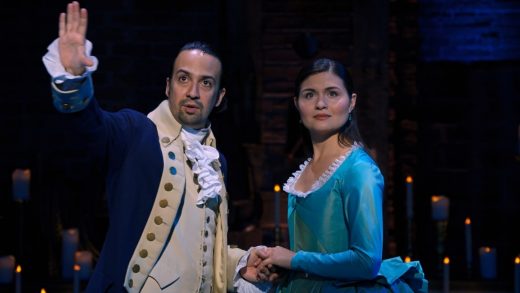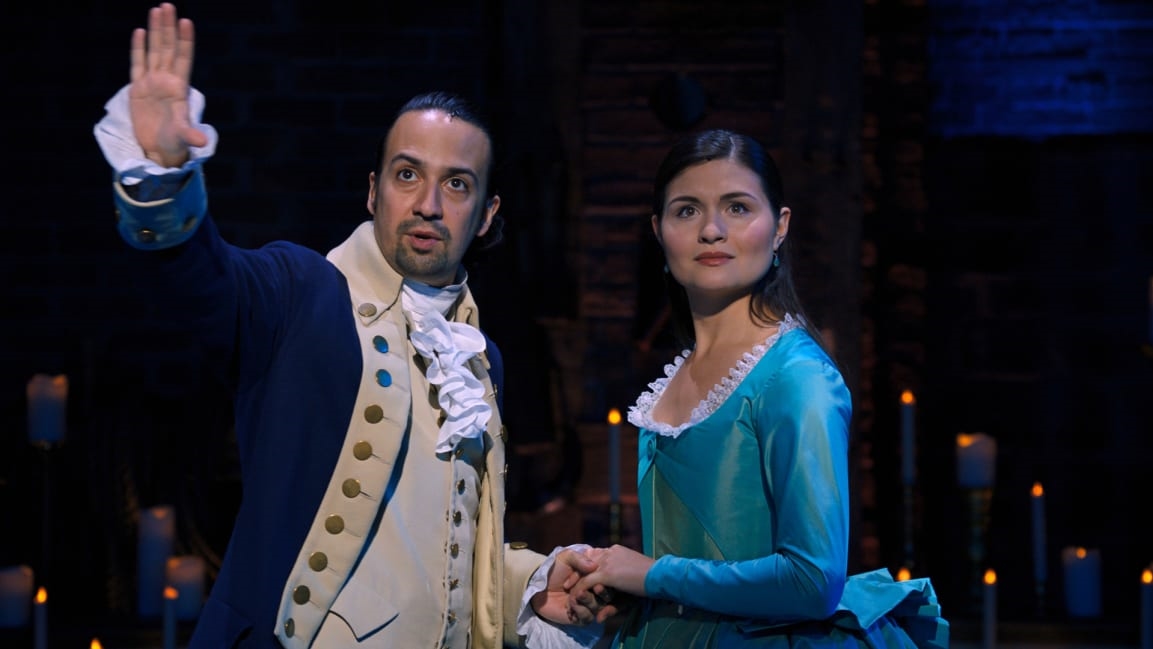‘Hamilton’ on Disney Plus is a nostalgic tour de force—and that’s the problem
July 03, 2020
On July 3, the global musical phenomenon Hamilton will hit the small screen on Disney Plus, giving at least 55 million subscribers (at last count) the chance to see a live taping of the Pulitzer Prize- and Tony Award-winning production performed by its original cast, including writer and composer Lin-Manuel Miranda in the titular role.
The musical was hailed as revolutionary theater when it came out in 2015. Watching it a presidential election cycle later feels like opening up a time capsule. The play, which Disney paid a whopping $75 million for, is a historical document—much like the Constitution Hamilton signed—reflecting a very different time and political climate than the one we are in today. It is a reminder of the idealism and optimism of the Obama era—for better and worse. The play is a sweeping experience, but it’s difficult to be swept up in its fantasy amid 2020’s depredation.
The Obama-era naivëte of ‘Hamilton’
The former president has been closely associated with Hamilton, even voicing the part of George Washington on a gospel reworking of the song “One Last Time” on the Hamilton Mixtape. Miranda has always let us know where his politics lie; in November 2016, the cast interrupted a performance to directly address Vice President Mike Pence sitting in the audience, “We, sir—we—are the diverse America who are alarmed and anxious that your new administration will not protect us, our planet, our children, our parents, or defend us and uphold our inalienable rights,” they said, adding, “We truly hope that this show has inspired you to uphold our American values and to work on behalf of all of us.”
But as the U.S. deals with three unprecedented crises, the novel coronavirus and the economic inequality it engendered, and police brutality targeting Black people, the central notion of Hamilton—that we can learn from our past mistakes and work toward a better and more inclusive future—feels outdated and a long way from becoming reality. It is impossible to ignore the events of the past four years.
At this moment, it seems as though history is repeating itself. Racial discrimination may have changed form, but it has always been present: The Black Lives Matter movement started under the Obama administration. Economic inequality—which has not only been ever-present but recall that the popularization of the “99% versus the 1%” is also an Obama-era innovation—has never been greater.
While Obama associated himself with the character of George Washington in Hamilton, President Trump has aligned himself with a different artistic representation of two of the founding fathers: Mount Rushmore. In May, the president announced that he would attend a fireworks display at the South Dakota landmark even as it draws increased criticism over its architect’s ties to the Ku Klux Klan, the land it stands on, and the legacies of those memorialized.

[Photo: courtesy of Disney Plus]
Not everyone can make it in Trump’s America
Miranda’s Hamilton is an outsider—the fact that he is an immigrant from the Caribbean is repeatedly brought up—someone with no money or connections, who willed himself to the center of the American narrative by “being smarter / working harder” and being more ambitious than anyone else.
In the new country, the play says, anyone can make it.
Hamilton’s rise is linked to the struggle of the American people, but Americans are struggling for different reasons now: As the middle class continues to shrink, and the country closes its doors to foreigners, the promise of a good life, attainable through hard and honest work, doesn’t line up with our current reality. Just last week, President Trump issued an order to block hundreds of thousands of foreign workers from finding work in the United States.
Hamilton’s foil, Aaron Burr, may serve as a better point of comparison to members of the current administration. Burr is written as a man of equal ambition, whose fatal flaw is his single-minded pursuit of power with no principles to back it up. Repeatedly asked what he stands for, Burr is unable to answer, instead expressing that he just wants to be a major player in government decision-making. Though he may have won the duel, the play suggests that history will not look kindly on his legacy.
George Washington’s foil, King George III (that’s the crazy one), threatening Americans with military action to maintain his hold on our country, “I will send a fully armed battalion / to remind you of my love,” is eerily reminiscent of the president’s threats to use military force to quell recent protests about George Floyd’s killing.
Perhaps the most American thing about Alexander Hamilton is his political undoing (he gets embroiled in a sex scandal), but Hamilton’s actions seem positively chaste compared to the Access Hollywood tape of Donald Trump claiming he “grabbed women by the pussy” that came out less than a year and a half after the play debuted and did not stop Trump from winning the election.
Leaving a legacy
Legacy is the driving question in Hamilton: “who lives, who dies, who tells your story?” is sung directly to the audience in the last number. In casting the play, Miranda literally rewrote history, incorporating inclusiveness by specifically writing the Founding Father parts for Black and Latino actors and composing a score with different genres of music, including rap and funk, into the score.
The play is a vision of what a multicultural, equal society could look like. The casting is a tacit acknowledgment that the United States as we know it would not exist without immigrant labor. Slavery is not ignored but mentioned selectively. Thomas Jefferson is criticized for being a slave owner by other characters—”A civics lesson from a slaver. Hey neighbor / Your debts are paid ’cause you don’t pay for labor”—but Washington’s slaves are never mentioned.
Hamilton’s legacy lives on in government (he was the architect of the modern American financial system), but it also continues through this musical.
It remains to be seen whether Obama’s legacy will continue in the arts—upon leaving politics, the former president and his wife inked a deal with Netflix to produce movies, TV series, and documentaries through their production company, called Higher Ground. The most recent project Netflix aired from Higher Ground was a documentary version of Michelle Obama’s autobiography, Becoming, an origin story that begins on the South Side of Chicago and ends after she leaves the White House.
It seems the former first family is trying to tell their story on their terms.
Hamilton presents a beautiful vision of a multicultural past—and future—to work toward. But as we grapple with America’s past, wondering whether the founders of the country had a few bad apples in their ranks, or whether the founding of the United States on the backs of slaves makes it rotten at its core, the Obama-Hamilton dream has never felt so far away.
Five and a half years after it came out, the play remains a masterpiece, but also an illusory fantasy.
Fast Company , Read Full Story
(10)



